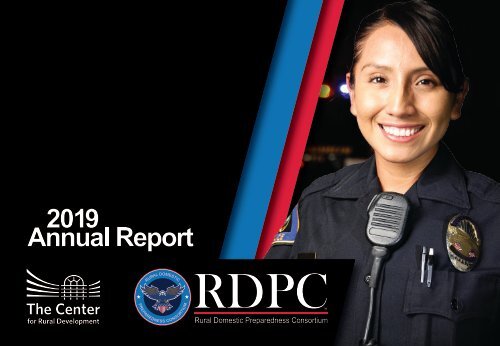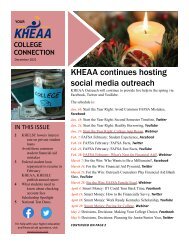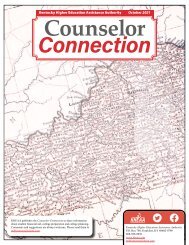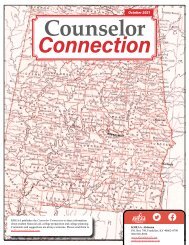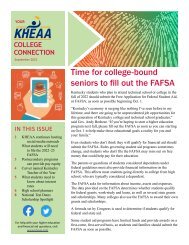2019 RDPC Annual Report
- No tags were found...
Create successful ePaper yourself
Turn your PDF publications into a flip-book with our unique Google optimized e-Paper software.
RURAL DOMESTIC<br />
PREPAREDNESS CONSORTIUM
The Rural Domestic Preparedness Consortium (<strong>RDPC</strong>), through it’s<br />
Consortium Members, will provide small, rural, and tribal responders and<br />
communities with the knowledge, skills, and abilities to enhance the safety,<br />
and quality of life for their citizens through training, technical assistance,<br />
and information sharing.<br />
RURAL DOMESTIC<br />
Rural communities across America will have the knowledge, skills, and<br />
abilities necessary to enhance the safety, security, and quality of life for<br />
citizens.<br />
PREPAREDNESS CONSORTIUM<br />
This project was supported by Cooperative Agreement Numbers EMW-2015-CA-00190-S01, EMW-2016-CA-00097-S01,<br />
EMW-2017-CA-00052-S01, EMW-2018-CA-00075-S01 and administered by the U.S. Department of Homeland Security. Points of view or<br />
opinions expressed in this document are those of the author and do not represent the official position or policies of U.S. Department of<br />
Homeland Security.<br />
FEMA’s National Training and Education Division (NTED) offers a full catalog of courses at no-cost to help build critical skills that<br />
responders need to function effectively in mass consequence events. Course subjects range from Weapons of Mass Destruction (WMD)<br />
terrorism, cybersecurity, and agro-terrorism to citizen preparedness and public works. NTED courses include multiple delivery methods:<br />
instructor-led (direct deliveries), train-the-trainers (indirect deliveries), customized (conferences and seminars) and web-based.<br />
Instructor-led courses are offered in residence (i.e. at a training facility) or through mobile programs, in which courses are brought to<br />
state and local jurisdictions that request the training. A full list of NTED courses can be found at www.firstrespondertraining.gov.
RURAL DOMESTIC<br />
PREPAREDNESS CONSORTIUM<br />
The Rural Domestic Preparedness Consortium<br />
(<strong>RDPC</strong>), led by The Center for Rural Development,<br />
is comprised of academic members with the<br />
expertise in developing and delivering homeland<br />
security curriculum for rural first responders. For<br />
more information visit us online at ...<br />
<strong>RDPC</strong> Mission & Vision.............................................2<br />
Executive Message....................................................4<br />
Meet The Consortium Members...............................5<br />
Meet the <strong>RDPC</strong> Staff...............................................6-7<br />
The Center for Rural Development.......................8-9<br />
What is Rural?..........................................................10<br />
Who We Train...........................................................11<br />
National Impact Map................................................12<br />
100,000 StudentsTrained.........................................13<br />
Tribal Nations Preparedness..................................14<br />
<strong>RDPC</strong> Courses (web-based)...................................15<br />
<strong>RDPC</strong> Courses (instructor led)..........................16-17<br />
<strong>RDPC</strong> By The Numbers......................................18-19<br />
Consortium Members.........................................20-31<br />
<strong>2019</strong> NDPC Quarterly Meeting...........................32-33<br />
FEMA Community Lifelines....................................34<br />
From the Director.....................................................35
The Rural Domestic Preparedness Consortium<br />
(<strong>RDPC</strong>) is a program of the United States<br />
Department of Homeland Security (DHS), Federal<br />
Emergency Management Agency (FEMA), and has<br />
worked for more than fourteen years preparing the<br />
nation’s small, rural, and tribal communities through<br />
all-hazards training.<br />
RURAL DOMESTIC<br />
<strong>RDPC</strong> has trained more than 100,000 rural first<br />
responders from January 2005 through December<br />
<strong>2019</strong>. Led by The Center for Rural Development in<br />
Somerset, KY, we train more than 8,000 first<br />
responders on an annual basis, providing training in<br />
all 50 states and 5 U.S. territories.<br />
PREPAREDNESS CONSORTIUM<br />
We look forward to continuing to serve small, rural,<br />
and tribal first responders in the years to come in an<br />
effort to ensure that rural communities across the<br />
country have the knowledge, skills, and abilities<br />
necessary to enhance the safety, security, and quality<br />
of life for their citizens.<br />
RURAL DOMESTIC<br />
PREPAREDNESS CONSORTIUM<br />
4
RURAL DOMESTIC<br />
Managed by The Center for Rural Development, <strong>RDPC</strong> is comprised of academic members with<br />
expertise and niche capabilities in developing and delivering training to small, rural, and tribal<br />
communities. We value each member, as well as their steadfast dedication to help others...<br />
PREPAREDNESS CONSORTIUM<br />
5
RURAL DOMESTIC<br />
PREPAREDNESS CONSORTIUM<br />
For more information regarding <strong>RDPC</strong>, our courses, and our members, visit www.ruraltraining.org or call us at 877-855-<strong>RDPC</strong> (7372)<br />
6
7
8
PREPAREDNESS CONSORTIUM<br />
RURAL DOMESTIC<br />
MISSION: The Center for Rural Development is a nonprofit organization fueled by a mission to provide leadership that stimulates<br />
innovative and sustainable economic development solutions and a better way of life for the citizens we serve. The Center also aspires<br />
to be the nationally recognized model for successful rural development.<br />
VISION: We help people feel safer through public safety initiatives; let people tap into their creative spirit though the arts; empower<br />
people through leadership education opportunities; and give people access through advanced technology; We change people’s<br />
lives.<br />
The Rural Domestic Preparedness Consortium (<strong>RDPC</strong>) is led by The Center for Rural Development in Somerset, KY. The Center was<br />
established in 1996 through the vision of U.S. Congressman Harold “Hal” Rogers (KY-05.)<br />
The Center has four Focus Areas: PUBLIC SAFETY, ARTS & CULTURE, LEADERSHIP, and TECHNOLOGY, serving a 45-county<br />
primary service area in Southern and Eastern Kentucky. We are committed to constantly expanding our capabilities in order to deliver<br />
a range of key services throughout Kentucky and beyond. The Center’s Public Safety programs are reaching first responders and law<br />
enforcement professionals across the nation.<br />
The Center has expertise in developing and administering training programs, including curriculum design, development and delivery,<br />
utilizing in-house web and video conference systems required to reach the rural homeland security community. As Executive Agent,<br />
The Center also plays a key role as a technology provider to the <strong>RDPC</strong> program. The Center is responsible for the design,<br />
development, and continued support of the <strong>RDPC</strong> web presence as well as online training registration, reservation, evaluation<br />
reporting capabilities, and learning management systems.<br />
9
RURAL DOMESTIC<br />
PREPAREDNESS CONSORTIUM<br />
Since its inception, <strong>RDPC</strong> has worked diligently to develop and deliver training to small and rural communities throughout<br />
the United States. While Americans tend to have an idealized image of rural America, a common definition for “rural” is<br />
difficult to find and is one of the most popular questions asked of <strong>RDPC</strong>.<br />
Consistent with guidance from the U.S. Census Bureau, <strong>RDPC</strong> defines the rural communities it serves as “any location<br />
with a population of less than 50,000 and with a population density of less than 1,000 persons per square mile.”<br />
In addition to the U.S. Census Bureau, most Federal agencies use a population threshold of under 50,000 to define a<br />
“rural” area.<br />
<strong>RDPC</strong> interprets the phrase, “any location,” as applying to cities, towns, villages, parishes, communities, and counties, a<br />
flexibility that ensures areas are not excluded unduly. For example, this definition can include a rural city within an urban<br />
county. The citizens of rural communities face unique challenges when preparing for all-hazards. For example, limited<br />
population and tax bases can create difficulties for community public safety agencies in terms of staffing, equipment, and<br />
other resources.<br />
In many cases, <strong>RDPC</strong> represents the only opportunity for emergency response service providers to obtain access to<br />
timely, effective training. Therefore, understanding rural America and working to identify its specific needs are critical<br />
tasks for <strong>RDPC</strong>.<br />
By speaking with rural responders and researching rural needs and capability gaps, <strong>RDPC</strong> recognizes that many rural<br />
response agencies are staffed by volunteers, and backfill for training remains an issue. Yet, rural responders represent<br />
the surge capacity and increased capabilities the U.S. relies on to assist in large scale disasters.<br />
A rural area is often the first line of defense to immediately contain an event or disaster before it escalates. It is imperative<br />
that rural responders receive the training and tools necessary to help keep the Nation safe and prepared.<br />
10
Agricultural Safety<br />
Animal Emergency Services<br />
Citizen / Community Volunteer<br />
Emergency Management<br />
Emergency Medical Services<br />
Fire Service<br />
Governmental Administrative<br />
Hazardous Materials<br />
Healthcare<br />
Information Technology<br />
Law Enforcement<br />
Private Sector<br />
Public Health<br />
Public Safety Communications<br />
Public Works<br />
Search and Rescue<br />
Transportation Security<br />
Other<br />
48<br />
46<br />
268<br />
1,393<br />
158<br />
771<br />
190<br />
41<br />
478<br />
24<br />
1,075<br />
59<br />
689<br />
70<br />
54<br />
71<br />
34<br />
1,156<br />
11
RURAL DOMESTIC<br />
PREPAREDNESS CONSORTIUM<br />
3,580<br />
378<br />
1,281<br />
2,706<br />
1,180<br />
982<br />
253<br />
773<br />
1,195<br />
5,948<br />
3,232<br />
591<br />
1,324<br />
3,900 2,544<br />
2,873<br />
1,227<br />
2001<br />
3,964<br />
2,202<br />
959<br />
1,560<br />
2,582<br />
1,523<br />
1,833<br />
1,524<br />
1,681<br />
714<br />
738<br />
569<br />
1,159<br />
1,379<br />
3,823<br />
4,840<br />
531<br />
6,169<br />
837<br />
293<br />
1,850<br />
563<br />
2,728<br />
4,819<br />
199<br />
5,708<br />
2,876<br />
932<br />
2,547<br />
3,062<br />
1,099<br />
4,583<br />
12
The Center for Rural Development is pleased to announce that the Rural<br />
Domestic Preparedness Consortium (<strong>RDPC</strong>) has surpassed it’s 100,000th<br />
student trained! <strong>RDPC</strong> has been training emergency responders in small,<br />
rural, and tribal communities for nearly 15 years. In-person, instructor-led<br />
courses as well as online courses are provided. “The Center is excited<br />
that our program has reached this huge milestone. We believe that<br />
every emergency responder that we train has an impact on their<br />
community, to make an impact on 100,000 is a major<br />
accomplishment for the <strong>RDPC</strong>. We hope to continue training and<br />
reach 200,000 students soon.” said Lonnie Lawson, President and CEO<br />
of The Center for Rural Development.<br />
On May 16th, <strong>2019</strong>, Stephanie Haggard attended the delivery of AWR<br />
209: Dealing with the Media: A Course for Emergency Responders in<br />
Winchester, KY and was the 100,000th student to complete a <strong>RDPC</strong><br />
course.<br />
Stephanie, Public Information Coordinator with the Northern Kentucky<br />
Health Department, just started her new role and wanted to attend the<br />
course to get a better understanding of how to handle a crisis. This 7-hour<br />
course provides rural first responders with skills needed to communicate<br />
with the public through the media and examines the roles of the media<br />
and the rural first responder/public information officer. Participants learn<br />
how to give print/electronic media interviews, write news releases, provide<br />
information at the scene, and how they fit into the joint information system.<br />
RURAL DOMESTIC<br />
PREPAREDNESS CONSORTIUM<br />
For Stephanie, there were several parts of the course she found to be<br />
important to her new role, “The hands-on experience is something that<br />
you don’t usually get the chance to learn unless you are in a crisis.<br />
Getting real world experience in a safe way was very helpful.”<br />
Stephanie said. “The templates provided have also been very helpful,<br />
I use them every time I write a press release. I haven’t had a press<br />
conference yet but I feel like I’m prepared if I ever do. Now I have the<br />
knowledge to step back and take a breath. Some questions are going<br />
to be hard, but now you are prepared so take a deep breath and<br />
answer as best you can.”<br />
Bobby Day, an <strong>RDPC</strong> instructor through consortium member Eastern<br />
Kentucky University, made an impact on the class. Stephanie spoke very<br />
highly of Mr. Day saying, “Bobby was very personable and had a lot of<br />
very good information. He made the class fun. It was a bit nerve<br />
racking to get in front of the class, but he made it fun. We laughed<br />
and learned.”<br />
This course is delivered by <strong>RDPC</strong> consortium member, Eastern Kentucky<br />
University (EKU). EKU is located in Richmond, KY and is one of 6<br />
academic members with the expertise in developing and delivering U.S.<br />
Department of Homeland Security curriculum for rural and tribal first<br />
responders. Bobby Day has been an instructor for <strong>RDPC</strong> courses for<br />
nearly 10 years. When asked what he believes is the most important thing<br />
that participants should take away from this course he responded, “Far<br />
more confidence in dealing with the media and giving the public the<br />
information that is expected as well as learning many techniques for<br />
dealing with tough questions and ultimately bringing credibility to<br />
themselves and the disciplines they represent.” Find out more<br />
information regarding <strong>RDPC</strong> by visiting www.ruraltraining.org or call by<br />
calling 877-855-<strong>RDPC</strong>(7372).<br />
RURAL DOMESTIC<br />
PREPAREDNESS CONSORTIUM<br />
13
The Rural Domestic Preparedness Consortium (<strong>RDPC</strong>) is committed<br />
to providing training to tribal nations in the event of a disaster. <strong>RDPC</strong><br />
continues to work with the Center for Agriculture and Food Security<br />
and Preparedness (CAFSP) at the University of Tennessee Institute<br />
of Agriculture (UTIA) to develop courses specifically for tribal nations.<br />
These courses include the following:<br />
PER 333 Isolation and Quarantine Response Strategies in the<br />
Event of a Biological Disease Outbreak in Tribal Nations<br />
MGT 449 Community Based Response to All-Hazards Threats<br />
in Tribal Communities<br />
In <strong>2019</strong>, MGT 449 and PER 333 had 129 registered course participants<br />
in 8 different tribal locations across the United States. Course instructors<br />
often gain valuable insight into course effectiveness and share their<br />
comments. “These courses often bring tribal members from<br />
different disciplines together to discuss preparedness issues. I<br />
have seen numerous communities have “a-ha” moments where<br />
they better understand their roles in an emergency and how those<br />
roles can best complement one other. It becomes a win for<br />
everyone,” said Julia Schlegel, <strong>RDPC</strong> Isolation and Quarantine<br />
Instructor.<br />
Due to <strong>RDPC</strong>’s positive impact in training tribal communities, valuable<br />
feedback from participants is often received. John Byars, a local point of<br />
contact (LPOC) from the Suquamish Indian Tribe, had this to say:<br />
“I came to the Suquamish Tribe last year on a grant to help the<br />
Tribe become NIMS compliant and to build the Tribe’s capacity to<br />
respond to emergencies. Being that the tribe is rural and<br />
somewhat isolated, I knew my job was not going to be an easy one.<br />
First, I met with my new supervisor, and the Tribes TERC to get a<br />
feel where we were and what direction we should go to reach our<br />
goals. I began looking on the NDPC website for training to help us<br />
get everyone a ‘feel’ for the direction needed to reach our goals,<br />
and the <strong>RDPC</strong> fits us perfectly. They tailor the classes to the rural<br />
setting and have been very accommodating on meeting our<br />
training needs. This year, I have once again requested training<br />
from them, and as we move forward, plan on doing so again next<br />
year. The training is written in such a manner I can bring it here to<br />
the reservation, and still share it with our partners off the<br />
reservation, so that we are training to the same standards.” To<br />
learn more about <strong>RDPC</strong> and the training we offer, visit us online at<br />
14
RURAL DOMESTIC<br />
PREPAREDNESS CONSORTIUM<br />
8hr AWR 148-W CRISIS MANAGEMENT FOR SCHOOL-BASED INCIDENTS:<br />
PARTNERING RURAL LAW ENFORCEMENT PERSONNEL, FIRST RESPONDERS, AND<br />
LOCAL SCHOOL SYSTEMS<br />
This course will educate rural law enforcement as well as school administrators and staff to<br />
effectively collaborate on planning and preparing for, responding to, and recovering from a<br />
school-based incident.<br />
.5hr AWR 187-W TERRORISM & WMD AWARENESS IN THE WORKPLACE<br />
Web-based “Terrorism 101” course prepares learners to successfully recognize, report, and<br />
react to potential terrorist incidents.<br />
6hr AWR 209-W DEALING WITH THE MEDIA: A COURSE FOR RURAL FIRST RESPONDERS<br />
Provides rural first responders with skills and strategies to communicate with the public<br />
through the media. Examines roles of the media and the first responder. Addresses how to<br />
give interviews, write news releases, distribute on-scene information, and fit into the Joint<br />
Information System.<br />
16hr MGT 335-W EVENT SECURITY PLANNING FOR PUBLIC SAFETY PROFESSIONALS<br />
Web-based, self-guided version of the two-day classroom course. Designed to provide<br />
public safety professionals with the essential skills and knowledge for planning and<br />
managing security for special events.<br />
2hr MGT 433-W ISOLATION & QUARANTINE FOR RURAL COMMUNITIES<br />
Provides emergency response management personnel with the general knowledge<br />
necessary to begin planning for situations requiring the isolation and/or quarantine (I&Q) of<br />
a large portion of local, rural population.<br />
15
AWR 144 Port & Vessel Security for Public Safety and<br />
Maritime Personnel (UF) 8hr<br />
Offers an introductory view of the marine transportation system<br />
and the security requirements of maritime facilities located in<br />
rural communities. Details threats to the system, security<br />
levels, regulatory requirements, and other information<br />
designed to assist public safety responders and planners in<br />
their interface with navigable waterways.<br />
AWR 147 Rail Car Incident Response (UF) 8hr<br />
Designed to increase the knowledge of first responders to<br />
better recognize and characterize the different types of freight<br />
rail cars, potential leaks, and courses of action to be taken<br />
based on an initial site assessment.<br />
AWR 148 Crisis Management for School-Based Incidents:<br />
Partnering Rural Law Enforcement, First Responders and<br />
Local School Systems (UF) 8hr<br />
Educates rural law enforcement personnel as well as school<br />
administrators and staff on the elements that must be in place<br />
to effectively collaborate on planning and preparing for,<br />
responding to, and recovering from a school-based incident.<br />
AWR 209 Working with the Media: A Course for Rural First<br />
Responders (EKU) 7hr<br />
Adapted from FEMA’s IG-290, this curriculum provides rural<br />
first responders with skills needed to communicate with the<br />
public through the media. Examines roles of the media and the<br />
rural first responder/public information officer. Participants<br />
learn how to give print/electronic media interviews, write news<br />
releases, provide information at the scene, and how they fit<br />
into the Joint Information System.<br />
AWR 232 Mass Fatalities Planning & Response for Rural<br />
Communities (NWACC) 8hr<br />
Designed to prepare first responders to manage a mass<br />
fatality incident impacting a rural jurisdiction. Issues addressed<br />
include roles and responsibilities, assets management,<br />
remains identification and processing, diversity issues,<br />
resource acquisition, and development of a plan.<br />
AWR 302 Pipeline Security in Rural Communities (UF)<br />
8hr Provides basic knowledge on the recognition of pipeline<br />
security threats and the identification of protection measures<br />
and mitigation strategies necessary to secure this critical<br />
infrastructure. Designed to bring together all rural pipeline<br />
security stakeholders in a scenario-based training<br />
environment.<br />
AWR 311 Small Vessel Security for Rural Communities<br />
(UF) 8hr<br />
Develops critical skills and increases response capabilities<br />
regarding maritime security incidents involving a small vessel.<br />
Identification of small vessel threats, mitigation strategies,<br />
community resources, and the development of regional<br />
partnerships are key topics discussed in a scenario-based<br />
training environment.<br />
AWR 328 All Hazards Preparedness for Animals in<br />
Disasters (UCD) 8hr<br />
Provides tools to protect, respond to, and recover from the<br />
consequences of disasters e.g. fire, flood, heat, earthquake,<br />
tornadoes, hurricanes, hazardous materials and catastrophic<br />
disease exposure involving animals in rural communities.<br />
MGT 335 Event Security Planning for Public Safety<br />
Professionals (EKU) 16hr<br />
Designed to provide planning and management level skills to<br />
officers from state and local public safety agencies with the<br />
essential skills and knowledge for planning and managing the<br />
security for special events and to identify guiding principles for<br />
special events security.<br />
MGT 381 Business Continuity Planning (NWACC) 8hr<br />
Prepares small and large businesses to effectively plan for<br />
emergencies of all types. Developed by the NorthWest<br />
Arkansas Community College’s Institute of Corporate and<br />
Public Safety in partnership with Wal-Mart Stores, Inc., Tyson<br />
Foods, Inc., and J.B. Hunt Transport Services, Inc., as well as<br />
with public sector first responders.<br />
MGT 383 Emergency Operations Plans for Rural<br />
Jurisdictions (EKU) 8hr<br />
Provides rural first responders with the skills to develop an<br />
Emergency Operations Plan (EOP) for their local jurisdiction or<br />
region. Participants are provided with knowledge on the<br />
planning process, the different types of EOP formats, and the<br />
components of each. Participants engage in scenarios<br />
designed to enable them to determine the best format for their<br />
particular jurisdiction and to organize the various planning<br />
components into an EOP.<br />
MGT 401 Planning and Intervention for Security Threat<br />
Groups, Hate, and Terrorist Groups in Rural Jails and<br />
Prisons (NCCU) 8hr<br />
Focuses on threat group recruitment and radicalization in<br />
correctional facilities and examines methods for strengthening<br />
information gathering and sharing. Utilizes case studies and<br />
exercises to illustrate recruitment mechanisms, define roles of<br />
various agencies, and explore practices, policies and<br />
conditions specific to rural facilities.<br />
MGT 403 Access and Functional Needs Preparedness<br />
Planning for Rural Communities (NWACC) 8hr<br />
Educates participants on the planning efforts needed to ensure<br />
the safety of those with functional needs, particularly those<br />
housed in assisted-living facilities and nursing homes during a<br />
crisis event. Exposes participants to the benefits of developing<br />
comprehensive emergency response plans for those most<br />
vulnerable during a crisis.<br />
MGT 405 Mobilizing Faith-Based Community<br />
Organizations in Preparing for Disaster (NCCU)<br />
8hr<br />
Educates representatives from faith-based organizations,<br />
emergency response agencies and others to strategically<br />
mobilize and engage community organizations (religious,<br />
charitable or non-governmental) in a reciprocal approach to<br />
disaster planning. Emphasizes grassroots mobilization and<br />
coordination in an effort to effectively reach the vulnerable<br />
populations they serve.<br />
16
MGT 406 Community Threat Group Identification,<br />
Assessment & Information <strong>Report</strong>ing for Rural Law<br />
Enforcement Officers (NCCU) 8hr<br />
Examines threat groups and networks that impact rural<br />
communities with a focus on gangs, hate groups, domestic<br />
and international terrorist organizations as they converge for<br />
the purposes of criminal enterprise. Discusses effective<br />
identification and reporting of activities in conformance with the<br />
Nationwide Suspicious Activity <strong>Report</strong>ing (SAR) Initiative.<br />
MGT 415 Disaster Recovery in Rural Communities (EKU)<br />
8hr Educates rural community leaders and emergency<br />
managers how to develop a plan to expedite recovery efforts<br />
and facilitate the long-term economic revitalization of their<br />
communities following a disaster. Integrates the National<br />
Disaster Recovery Framework as a foundation.<br />
MGT 416 Introduction to Continuity of Government<br />
Operations Planning for Rural Jurisdictions (NWACC) 8hr<br />
Planning for rural communities aids government officials and<br />
emergency responders in the development of plans to ensure<br />
the continuity of essential government functions across a<br />
spectrum of emergencies. Course focuses on succession<br />
planning, delegation of authority, redundant communications,<br />
and alternate facilities.<br />
MGT 417 Crisis Management for School-Based Incidents<br />
for Key Decision Makers (UF) 16hr<br />
Provides law enforcement, other emergency responders,<br />
school personnel, and community stakeholders the<br />
operational-level details to plan, prepare, communicate,<br />
respond, and recover from a school<br />
based incident. Scenario-based<br />
activities allow participants to practice<br />
their interoperable skills to ensure<br />
collaborative strategies are in place<br />
for effective crisis prevention,<br />
response, and recovery in the K-12<br />
environment.<br />
MGT 433 Isolation & Quarantine for Rural Communities<br />
(NWACC) 8hr<br />
Provides emergency response management personnel with<br />
the general knowledge necessary to begin planning for<br />
situations requiring the isolation and/or quarantine (I&Q) of a<br />
large portion of a local, rural population. This instructor-led<br />
training course will provide government officials, emergency<br />
managers and team members with information on I&Q in a<br />
modern context; legal and ethical issues associated with I&Q;<br />
and preparedness, planning, response, and support<br />
considerations.<br />
MGT 448 All Hazards Planning for Animal, Agricultural,<br />
and Food Related Disasters (UCD) 8hr<br />
Provides background information needed to lead a<br />
multi-agency team of emergency planners in the development<br />
of an Emergency Support Functions (ESF) annex for food<br />
and/or animal related disasters to supplement their<br />
community’s existing Emergency Operations Plan (EOP).<br />
MGT 449 Community Based Response to All-Hazards<br />
Threats in Tribal Communities (UT) 16hr<br />
The purpose of this course is to provide tribal nations with the<br />
knowledge, skills and abilities necessary to effectively detect,<br />
respond to, manage and mitigate all-hazard threats using a<br />
whole community approach. This includes a practical exercise<br />
designed specifically to meet the needs of tribal communities.<br />
PER 294 Testing an Emergency Operations Plan in a Rural<br />
EOC (EKU) 8hr<br />
Designed to test a community’s emergency operations plan in<br />
an Emergency Operations Center (EOC) environment.<br />
Provides relevant training to elected officials, EOC personnel,<br />
and rural community leaders from public and private sector<br />
entities. Features a performance-oriented exercise designed to<br />
replicate the function of the EOC during a simulated<br />
emergency.<br />
PER 333 Isolation and Quarantine Response Strategies in<br />
the Event of a Biological Disease Outbreak in Tribal<br />
Nations (UT) 12hr<br />
The purpose of this course is to provide tribal nations with the<br />
knowledge, skills and abilities necessary to effectively detect,<br />
respond to, and mitigate a disease outbreak, using a whole<br />
community approach. The course includes a practical exercise<br />
that will be designed specifically to meet the needs of the tribal<br />
communities.<br />
17
PREPAREDNESS CONSORTIUM<br />
RURAL DOMESTIC<br />
AWR 144<br />
AWR 147<br />
AWR 148<br />
AWR 209<br />
AWR 232<br />
AWR 302<br />
AWR 328<br />
MGT 335<br />
MGT 381<br />
MGT 383<br />
MGT 401<br />
MGT 403<br />
MGT 405<br />
MGT 415<br />
MGT 416<br />
MGT 417<br />
MGT 433<br />
MGT 448<br />
MGT 449<br />
PER 294<br />
PER 308<br />
PER 333<br />
Port and Vessel Security for Public Safety and Maritime Personnel<br />
Rail Car Incident Response<br />
Crisis Management for School-Based Incidents: Partnering Rural Law<br />
Enforcement, First Responders and Local School Systems<br />
Working with the Media: A Course for Rural First Responders<br />
Mass Fatalities Planning and Response for Rural Communities<br />
Pipeline Security in Rural Communities<br />
All-Hazards Preparedness for Animals in Disasters<br />
Event Security Planning for Public Safety Professionals<br />
Business Continuity Planning<br />
Emergency Operations Plans for Rural Jurisdictions<br />
Planning and Intervention for Security Threat Groups, Hate and Terrorist Groups<br />
in Rural Jails and Prisons<br />
Access and Functional Needs Preparedness Planning for Rural Communities<br />
Mobilizing Faith-Based Community Organizations in Preparing for Disaster<br />
Disaster Recovery in Rural Communities<br />
Continuity of Government Operations Planning for Rural Communities<br />
Crisis Management for School-Based Incidents for Key Decision Makers<br />
Isolation and Quarantine for Rural Communities<br />
All-Hazards Planning for Animal, Agricultural, and Food Related Disasters<br />
Community Based Response to All-Hazards Threats in Tribal Communities<br />
Testing an Emergency Operations Plan in a Rural EOC<br />
Rural Isolation and Quarantine for Public Health and Healthcare Professionals<br />
Isolation and Quarantine Response Strategies in the Event of a Biological<br />
Disease Outbreak in Tribal Nations<br />
159<br />
639<br />
1184<br />
----<br />
158<br />
675<br />
124<br />
187<br />
168<br />
123<br />
182<br />
39<br />
----<br />
988<br />
323<br />
459<br />
211<br />
212<br />
121<br />
163<br />
111<br />
221<br />
80<br />
98<br />
RURAL DO<br />
PREPAREDNESS<br />
18
MESTIC<br />
AWR 148-W<br />
AWR 187-W<br />
AWR 209-W<br />
MGT 335-W<br />
MGT 433-W<br />
Crisis Management for School-Based Incidents: Partnering Rural<br />
Law Enforcement, First Responders, and Local School Systems<br />
Terrorism and WMD Awareness in the Workplace<br />
Dealing with the Media: A Course for Rural First Responders<br />
Event Security Planning for Public Safety Professionals<br />
Isolation and Quarantine for Rural Communities<br />
398<br />
----<br />
1399<br />
155<br />
163<br />
109<br />
CONSORTIUM<br />
INSTRUCTOR-LED COURSE COMPLETIONS<br />
OUR WEB-BASED COURSE COMPLETIONS<br />
TOTAL COURSE COMPLETIONS IN <strong>2019</strong><br />
19
Jason Sirney | Instructor<br />
Eastern Kentucky University (EKU) in Richmond,<br />
Kentucky is a regional comprehensive university that<br />
enrolls more than 16,500 undergraduate and graduate<br />
students. The College of Justice and Safety is EKU’s first<br />
and only Program of Distinction, a special designation of<br />
the Commonwealth of Kentucky which recognizes unique<br />
academic expertise. The College, one of six within the<br />
university, has a reputation for being on the frontline of<br />
learning and research in the fields of justice and safety.<br />
The College consists of the following service centers and<br />
academic departments: The Justice & Safety Center<br />
(JSC), The School of Safety, Security & Emergency<br />
Management, and The School of Justice Studies.”<br />
Eastern Kentucky University<br />
Justice & Safety Center<br />
521 Lancaster Ave.<br />
Richmond, KY 40475<br />
“Great course. Very pertinent to<br />
public safety position & work.”<br />
- C. McClain, MGT 335<br />
“The instructor was extremely<br />
knowledgeable and engaging.”<br />
- participant, AWR 209<br />
As a member of the Consortium, Eastern Kentucky University’s<br />
Justice and Safety Center is delivering the following courses:
Course Highlight: MGT 335 Course Highlight: AWR 209<br />
<strong>RDPC</strong> courses are making an impact! One of these<br />
courses is MGT 335 Event Security Planning for<br />
Public Safety Professionals, which was held in<br />
Knoxville, TN on August 28th, <strong>2019</strong>. With 46 students<br />
participating, this course delivery effectively equipped<br />
officers from state and local public safety agencies with<br />
the essential skills and knowledge for planning and<br />
managing the security for special events and to identify<br />
guiding principles for special events security. These<br />
skills are essential to building and maintaining event<br />
security safety strategies that will ensure the safety of<br />
community members, as well as the first responders<br />
who serve them. The positive impact of this course was<br />
evident from the numerous comments received<br />
post-delivery. M Strutner, an MGT 335 course<br />
participant said the course was “entertaining, thought<br />
provoking with real-world experiences as<br />
examples.” R. Barret, another course participant,<br />
stated that the course “exceeded expectations.”<br />
<strong>RDPC</strong> values feedback from our nation’s first<br />
responders who attend our courses. This allows us to<br />
get a glimpse of the impact that <strong>RDPC</strong> courses have<br />
on small, rural, and tribal communities across the<br />
nation.<br />
<strong>RDPC</strong> courses continue to make an impact! One of<br />
these courses is AWR 209 Working with the Media: A<br />
Course for Rural First Responders, which is held in<br />
multiple rural jurisdictions across the U.S. This course<br />
provides rural first responders with essential skills for<br />
communicating with the public through the media.<br />
In AWR 209, students experience beneficial educational<br />
moments that leave an impact. “The exercise and<br />
team scenario was very valuable. It allowed each to<br />
benefit from role playing a live interview during a<br />
crisis situation,” says one AWR 209 student. Other<br />
students said the course was “easy to follow” and<br />
“informative.”<br />
AWR 209 remains successful in preparing first<br />
responders in communicating with the public through<br />
the media. For more information on this course, or to<br />
learn more about other <strong>RDPC</strong> courses, visit<br />
www.ruraltraining.org<br />
Our course instructors have a vast amount of education and expertise.<br />
Instructors include: Ty Davisson, Bobby Day, Jim Garrett, Susan<br />
Green, John James, Ryan Nicholls, Patrick O’Brien, David Pichette,<br />
Jason Sirney, Jay Tillerson, Brendan Tomaino, Branch Walton, and<br />
Jerry Wells.<br />
RURAL DOMESTIC<br />
PREPAREDNESS CONSORTIUM<br />
21
North Carolina Central University (NCCU) is a top-ranked<br />
historically black university and regional university in the south<br />
by U.S. News & World <strong>Report</strong>. The university serves as a hub<br />
for intellectual dialogue and discourse and a source of<br />
academic distinction and game-changing innovation for North<br />
Carolina, the United States and the world. Founded in 1910,<br />
NCCU is the oldest publicly-funded liberal arts college<br />
founded for African-Americans in the nation. Located in the<br />
state’s Research Triangle, NCCU has an enrollment of 8,012<br />
students (Fall 2018) from continents including North America,<br />
South America and Europe.<br />
The university offers bachelor’s degrees in 100 disciplines,<br />
master’s degrees in more than 40 areas, and a Ph.D. in<br />
Integrated Biosciences. NCCU’s signature graduate and<br />
undergraduate degrees are housed in seven colleges and<br />
schools: College of Arts and Sciences; College of Behavioral<br />
and Social Sciences; School of Business; School of<br />
Education; School of Graduate Studies; School of Law; and<br />
School of Library and Information Sciences.<br />
Dr. M. Chris Herring | Instructor<br />
As a member of the Consortium, North Carolina Central<br />
University is delivering the following courses:<br />
North Carolina Central University<br />
1801 Fayetteville St.<br />
Durham, NC 27707
Course Highlight: MGT 405 Course Highlight: MGT 401<br />
<strong>RDPC</strong> courses are making an impact! One of these courses<br />
is MGT 405 Mobilizing Faith-Based Community<br />
Organizations in Preparing for Disaster, which was held<br />
in Sonora, CA on August 7th, <strong>2019</strong>. This management-level<br />
course is taught across the nation, bringing positive impact<br />
to communities through strategic education and planning,<br />
uniting faith-based organizations, emergency response<br />
agencies and others in the event of a disaster.<br />
The positive impact of this course was evident from the<br />
numerous comments received post-delivery. One participant<br />
found the course most valuable in regard to understanding<br />
“The knowledge that government and faith-based<br />
organizations need to work together.” MGT 405 brings<br />
clear guidance in regard to unifying community efforts in the<br />
event of a disaster. “First time I finally understand the<br />
levels of government in relation to disaster,” says<br />
another participant following the course. Students<br />
expressed their appreciation for the knowledge and<br />
expertise of the instructor, who was described as a “great<br />
facilitator.”<br />
Sonora, CA and other MGT 405 delivery locations are<br />
stronger, more prepared in the event of a disaster. This<br />
course “Stimulates partnerships and got us all thinking<br />
about how we can support and participate<br />
appropriately,” said one MGT 405 participant.<br />
<strong>RDPC</strong> courses continue to make an impact! One of these<br />
courses is MGT 401 Planning and Intervention for<br />
Security Threat Groups in Rural Jails and Prisons,<br />
which is held in multiple rural jurisdictions across the U.S.<br />
MGT 401 focuses on threat group recruitment and<br />
radicalization in correctional facilities and examines<br />
methods for strengthening information gathering and<br />
sharing. One course participant said “The entire course<br />
was top notch. Very beneficial...Instructor Fountain was<br />
very knowledgeable and kept the class fun.” When<br />
asked what part of the course was most helpful, an MGT<br />
401 participant said “Interpreting letters and<br />
communication between inmates,” which is a valuable<br />
skill for correctional officers.<br />
AWR 401 is described by participants as “very<br />
informative” and remains successful in preparing students<br />
with invaluable skills in rural correctional facility<br />
environments. For more information on this course, or to<br />
learn more about other <strong>RDPC</strong> courses, visit<br />
www.ruraltraining.org<br />
Our course instructors have a vast amount of education and expertise.<br />
Instructors include: Art Beeler, Robert Fountain, Gregg Varner, Johnny<br />
Hawkins, Dr. M. Chris Herring, Dr. Johnny Holloway, Princess Ousley,<br />
Dr. Theresa Pickett.<br />
RURAL DOMESTIC<br />
PREPAREDNESS CONSORTIUM<br />
23
As a member of the Consortium, NorthWest Arkansas Community<br />
College is delivering the following courses:<br />
AWR 232 Mass Fatalities Planning and Response for Rural<br />
Communties<br />
MGT 381 Business Continuity Planning<br />
MGT 403 Access and Functional Needs Preparedness Planning<br />
for Rural Communities<br />
MGT 416 Continuity of Government Operations Planning<br />
for Rural Communities<br />
MGT 433 Isolation and Quarantine for Rural Communities<br />
“NorthWest Arkansas Community College (NWACC) was<br />
founded in August 1990 with 1,200 students. Today,<br />
NWACC serves more than 15,000 students in college credit<br />
and non-credit courses in Benton and Washington counties.<br />
NWACC is a comprehensive, public two-year college that<br />
serves to empower lives, inspire learning, and strengthen<br />
communities through accessible, affordable, quality<br />
education. The commitment of NWACC to life-long learning<br />
can be seen in the quality of instruction it offers, and the<br />
variety of programs it has designed to move students into<br />
the job market in a minimum amount of time, enrich<br />
people's lives, and prepare them to further their education.<br />
Established in 2005, the Institute for Corporate and Public<br />
Safety (ICPS) is part of the Workforce and Economic<br />
Development division at NWACC. During its tenure, ICPS<br />
developed and maintains 8 active instructor-led and online<br />
courses that to date have been delivered throughout the<br />
United States and territories, and trained more than 16,000<br />
people in more than 500 communities.”<br />
“All modules were essential and<br />
important... individually<br />
valuable.”- participant, AWR 232<br />
“Instructor was thorough and<br />
engaging. She kept the<br />
motivation high...” -A. Davis, MGT<br />
403<br />
NorthWest Arkansas Community College<br />
Workforce & Economic Development<br />
1 College Dr.<br />
Bentonville, AR 72712
Course Highlight: MGT 403 Course Highlight: AWR 232<br />
<strong>RDPC</strong> courses are making an impact! One of these<br />
courses is MGT 403 Access and Functional Needs<br />
Preparedness Planning for Rural Communities, which<br />
was held in St. Thomas, U.S. Virgin Islands, on<br />
November 5th, <strong>2019</strong>. With 21 students in attendance,<br />
this course educated attendees on critical planning<br />
efforts needed to ensure the safety of those with<br />
functional needs, particularly those housed in<br />
assisted-living facilities and nursing homes during a<br />
crisis event. “Awesomely Informative. A training that<br />
our island is appreciative for. Thank you for<br />
exceeding my expectations,” said Beatrice Gumbs,<br />
MGT 403 student. Thought-provoking information and<br />
scenarios made an impact on Anita Davis as well. “This<br />
course was very enlightening and broadened my<br />
idea of ‘special populations’. The instructor was so<br />
thorough and engaging. She kept the motivation<br />
high...” MGT 403 is strengthening communities, as<br />
well as increasing awareness of those most vulnerable<br />
during a crisis.<br />
<strong>RDPC</strong> values feedback from our nation’s first<br />
responders who attend our courses. This allows us to<br />
get a glimpse of the impact that <strong>RDPC</strong> courses have on<br />
small, rural, and tribal communities across the nation.<br />
<strong>RDPC</strong> courses continue to make an impact! One of<br />
these courses is AWR 232 Mass Fatalities Planning and<br />
Response for Rural Communities, which is held in<br />
multiple rural jurisdictions across the U.S. and outlying<br />
U.S. territories. This course is designed to prepare first<br />
responders to manage a mass fatality incident<br />
impacting a rural jurisdiction.<br />
In AWR 232, knowledge and preparation are key.<br />
“Learning civilian response operations will help<br />
with working with the local community during an<br />
incident,” said one student when describing what part<br />
of the course was most valuable. Another student<br />
commented that “The tabletop exercises brought it<br />
all together” when preparing for a mass fatality<br />
incident. Students submit numerous other comments<br />
such as “the instructor [demonstrated] a vast<br />
amount of knowledge and experience.”<br />
AWR 232 remains successful in preparing essential<br />
personnel in responding to mass fatality incidents in<br />
rural communities. For more information on this course,<br />
or to learn more about other <strong>RDPC</strong> courses, visit<br />
www.ruraltraining.org<br />
Our course instructors have a vast amount of education and expertise.<br />
Instructors include: Glenda Adkisson, Jane Cash, DeeEll Fifield, Arbie<br />
Goings, and Gregory Klimetz.<br />
RURAL DOMESTIC<br />
PREPAREDNESS CONSORTIUM<br />
25
As a member of the Consortium, the University of California,<br />
Davis, is delivering the following courses:<br />
AWR 328 All Hazards Preparedness for Animals in Disasters<br />
MGT 448 All Hazards Planning for Animal, Agricultural, and Food<br />
Related Disasters.<br />
The Western Institute for Food Safety and Security<br />
(WIFSS) is a University of California, Davis program of<br />
the School of Veterinary Medicine and the College of<br />
Agricultural and Environmental Sciences.<br />
Our mission is to serve the global community by<br />
conducting research, developing training, and providing<br />
outreach programs that will enhance the health and<br />
security of people, animals, and the environment.<br />
We serve as a valuable resource for state and federal<br />
agencies, academic institutions, the veterinary profession,<br />
interest groups, and the public on all matters related to<br />
food safety. Our extension and education programs apply<br />
a One Health approach in developing the means of<br />
identifying, and more specifically preventing future<br />
foodborne outbreaks. We focus on reducing the risk<br />
factors leading to contamination of raw agricultural<br />
products and reducing the pathogens associated with<br />
animal products.<br />
University of California-Davis<br />
1 Shields Ave.<br />
Davis, CA 95616
Course Highlight: AWR 328 Course Highlight: MGT 448<br />
<strong>RDPC</strong> courses are making an impact! One of these<br />
courses is AWR 328 All Hazards Preparedness for<br />
Animals in Disasters, which is held in multiple rural<br />
jurisdictions across the U.S. This awareness-level<br />
course provides tools to protect, respond to, and<br />
recover from the consequences of disasters e.g.<br />
earthquakes, tornadoes, hurricanes, hazardous<br />
materials and catastrophic disease exposure involving<br />
animals in rural communities.<br />
<strong>RDPC</strong> instructors are excellent at fostering an effective<br />
learning environment. Comments such as “Excellent<br />
job by instructor. Very professional and made the<br />
class enjoyable” give us valuable insight to the<br />
positive impact of this course. “I loved that the<br />
course used real life situations,” said one student in<br />
regard to course structure. Using real life examples of<br />
past events prepares communities for future disasters.<br />
<strong>RDPC</strong> values feedback from our nation’s first<br />
responders who attend our courses. This allows us to<br />
get a glimpse of the impact that <strong>RDPC</strong> courses have<br />
on small, rural, and tribal communities across the<br />
nation.<br />
<strong>RDPC</strong> courses continue to make an impact! One of<br />
these courses is MGT 448 All-Hazards Planning for<br />
Animal, Agricultural, and Food Related Disasters,<br />
which is held in multiple rural jurisdictions across the<br />
U.S. This management-level course provides<br />
information needed to lead a multi-agency team of<br />
emergency planners in the development of an<br />
Emergency Support Functions (ESF) annex for food<br />
and/or animal-related disasters to supplement their<br />
community’s existing Emergency Operations Plan<br />
(EOP).<br />
After a <strong>2019</strong> MGT 448 course completion in Laredo,<br />
TX, one course participant had this to say: “[It was<br />
valuable] that there is a course on this subject<br />
matter. It’s difficult to find emergency management<br />
classes that are specific to animal issues. The<br />
quality of the content is great and the instructors<br />
are wonderful.” Others found it most valuable to<br />
“write out example [emergency] plans for the<br />
example county” while in the classroom.<br />
MGT 448 remains successful in training participants for<br />
all-hazards planning regarding animals, agricultral, and<br />
food-related disasters. For more information about<br />
<strong>RDPC</strong> courses, visit www.ruraltraining.org.<br />
Our course instructors have a vast amount of education and expertise.<br />
Instructors include: David Goldenburg, Art Johnstone, Michael Payne,<br />
Tracey Stevens, Michael Turner, and Brian Whipple.<br />
RURAL DOMESTIC<br />
PREPAREDNESS CONSORTIUM<br />
27
“Real world experience that tied course information with<br />
actual events. This allowed [the] audience to fully grasp [the]<br />
information. Wonderful instructor.”<br />
-participant, AWR 148<br />
The University of Findlay (UF), located in Findlay, OH, is an<br />
<strong>RDPC</strong> member. It is a private liberal arts college founded in<br />
1882. It is home to over 5,000 students. The University of<br />
Findlay’s All Hazards Training Center (Findlay All Hazards)<br />
provides customized education, training, and information<br />
transfer programs focusing on environmental, safety, and<br />
health (ESH) issues as well as security management and<br />
emergency/disaster preparedness for both industry and<br />
emergency responders across the U.S.<br />
Findlay All Hazards strives to keep the customer training<br />
needs paramount by the fact that 90% of training occurs<br />
onsite at client locations. Since inception in 1986, the<br />
training center has trained over 250,000 people<br />
coast-to-coast. UF annually trains, on average, more than<br />
11,000 people in over 600 classes, over 40 states, across<br />
the U.S. and Canada. UF is one of a few institutions<br />
nationwide that integrates ESH, Emergency/Disaster<br />
Preparedness training, and the opportunity to earn ESH<br />
undergraduate & graduate degree programs.<br />
As a member of the Consortium, the University of Findlay, is<br />
delivering the following courses:<br />
AWR 144: Port and Vessel Security<br />
AWR 147: Rail Car Incident Response<br />
AWR 148: Crisis Management for School-Based Incidents:<br />
Partnering Rural Law Enforcement, First<br />
Responders, and Local School Systems.<br />
AWR 302: Pipeline Security for Rural Communities<br />
AWR 311: Small Vessel Security for Rural Communities<br />
MGT 417: Crisis Management for School-Based Incidents
Course Highlight: AWR 148 Course Highlight: MGT 417<br />
<strong>RDPC</strong> courses are making an impact! One of these<br />
courses is AWR 148 Crisis Management for<br />
School-Based Incidents: Partnering Rural Law<br />
Enforcement, First Responders and Local School<br />
Systems, which is held in multiple rural jurisdictions<br />
across the U.S. This awareness-level course educates<br />
rural law enforcement personnel as well as school<br />
administrators and staff on the elements that must be<br />
in place to effectively collaborate on planning and<br />
preparing for, responding to, and recovering from a<br />
school-based incident. Students benefit from<br />
hearing“real world experience” from instructors that<br />
ties course information with actual events. For many,<br />
this course helps broaden participant’s perspective of<br />
these types of incidents. One student expressed<br />
satisfaction with the course. “[I have] many years in<br />
law enforcement and active shooter trainings, but<br />
never a course that covered everything that leads<br />
up to that!”<br />
<strong>RDPC</strong> values feedback from our nation’s first<br />
responders who attend our courses. This allows us to<br />
get a glimpse of the impact that <strong>RDPC</strong> courses have<br />
on small, rural, and tribal communities across the<br />
nation.<br />
<strong>RDPC</strong> courses continue to make an impact! One of<br />
these courses is MGT 417 Crisis Management for<br />
School-Based Incidents for Key Decision Makers,<br />
which is held in multiple rural jurisdictions across the<br />
U.S. This management-level course provides law<br />
enforcement, other emergency responders, school<br />
personnel, and community stakeholders the<br />
operational-level details to plan, prepare,<br />
communicate, respond, and recover from a<br />
school-based incident.<br />
This course is found by students to be engaging and<br />
effective. The instructors implement valuable<br />
experience when teaching these courses. “[The]<br />
instructors created an environment in which<br />
people feel free to discuss things. It made the<br />
course more enjoyable and greatly facilitated the<br />
learning process.” Another student described MGT<br />
417 as “eye opening” as different agency<br />
representatives collaborated during the course.<br />
MGT 417 remains successful in preparing participants<br />
in crisis management for school-based incidents. For<br />
more information about MGT 417 and other <strong>RDPC</strong><br />
courses, visit www.rualtraining.org.<br />
Our course instructors have a vast amount of education and expertise.<br />
Instructors include: Dave Bowman, Steven Browning, Kevin Durbin,<br />
Tim Hill, Jeffrey Hilty, Rick Hoffman, Duane Jones, Scott Lowry, Tim<br />
Maloney, Rodger Norcross, Tyler Pendleton, Tom Rinebolt, Laurie<br />
Thomas, Branch Walton, and Mike Webber.<br />
RURAL DOMESTIC<br />
PREPAREDNESS CONSORTIUM<br />
29
As an affiliate of the Consortium, the University of Tennessee is<br />
delivering the following courses:<br />
PER 333 Isolation and Quarantine Response Strategies in the<br />
Event of a Biological Disease Outbreak in Tribal Nations<br />
MGT 449 Community Based Response to All-Hazards Threats in<br />
Tribal Communities<br />
“...directly applicable in my<br />
tribal community for potential<br />
scenarios.”- participant, MGT 449<br />
“The exercises were very<br />
valuable. They really put<br />
things into perspective...”<br />
-participant, PER 333<br />
<strong>RDPC</strong> continues to work with the Center for Agriculture and<br />
Food Security and Preparedness (CAFSP) at the University<br />
of Tennessee Institute of Agriculture (UTIA) to develop<br />
courses specifically for tribal nations. Instructors from<br />
CAFSP work with tribal nations to determine the needs of<br />
the community prior to each training. Through its colleges,<br />
research and education centers, and county extension<br />
offices, the University serves the people of Tennessee and<br />
beyond through the discovery, communication, and<br />
application of knowledge. UTIA, working with the University<br />
of Tennessee - Knoxville, is committed to providing<br />
undergraduate, graduate, and professional education<br />
programs in a diverse learning environment that prepares<br />
students to be leaders in a global society. The Institute’s<br />
delivery of education, discovery, and outreach contributes to<br />
the economic, social, and environmental well-being of all<br />
Tennesseans and focuses on contemporary problems faced<br />
by Tennessee, the nation, and the world.
Course Highlight: PER 333 Course Highlight: MGT 449<br />
<strong>RDPC</strong> courses are making an impact! One of these<br />
courses is PER 333 Isolation and Quarantine<br />
Response Strategies in the Event of a Biological<br />
Disease Outbreak in Tribal Nations, which is held in<br />
tribal nations across the U.S. This course provides<br />
tribal nations with the knowledge, skills and abilities<br />
necessary to effectively detect, respond to, manage,<br />
and mitigate all-hazard threats using a whole<br />
community approach.<br />
PER 333 uses practical exercises to facilitate learning.<br />
“The exercises were very valuable. They really put<br />
things into perspective,” said one course participant.<br />
Course participants gain confidence and are better<br />
prepared for isolation and quarantine response. “I feel<br />
better prepared and informed [to perform] an<br />
isolation or quarantine protocol.” PER 333<br />
continues to make a positive impact within tribal<br />
nations in regard to response strategies and best<br />
practices.<br />
<strong>RDPC</strong> values feedback from our nation’s first<br />
responders who attend our courses. This allows us to<br />
get a glimpse of the impact that <strong>RDPC</strong> courses have<br />
on tribal, rural, and small communities across the<br />
nation.<br />
<strong>RDPC</strong> courses continue to make an impact! One of<br />
these courses is MGT 449 Community Based<br />
Response to All-Hazards Threats in Tribal<br />
Communities, which is held in tribal nations across<br />
the U.S. Like PER 333, this management-level course<br />
provides tribal nations with the knowledge, skills and<br />
abilities necessary to effectively detect, respond to,<br />
manage, and mitigate all-hazard threats using a whole<br />
community approach.<br />
MGT 449 has been described as “directly applicable<br />
in my tribal community for potential scenarios.”<br />
This course helps participants gain a valuable<br />
perspective from experienced instructors. When asked<br />
what was most valuable in regard to MGT 449, a<br />
participant commented by saying “...Planning for the<br />
wildfire gave me an insight into how much work is<br />
done and what all is needed.”<br />
MGT 449 remains successful in preparing tribal<br />
communities to respond to all-hazards threats. For<br />
more information about this course, or other <strong>RDPC</strong><br />
courses, visit www.ruraltraining.org.<br />
Our course instructors have a vast amount of education and expertise.<br />
Instructors include: Greg Gould, Ray Burden, Kelly Hamilton, Bob<br />
Silver, Matthew Welborn, and Julie Schlegel.<br />
RURAL DOMESTIC<br />
PREPAREDNESS CONSORTIUM<br />
31
RURAL DOMESTIC<br />
Rural Domestic Preparedness Consortium members and staff pause<br />
for a group photo during the <strong>2019</strong> NDPC Quarterly Meeting that was<br />
held in July of <strong>2019</strong> in Louisville, Kentucky.<br />
PREPAREDNESS CONSORTIUM<br />
(Not pictured is Dr. Sharon Thompson, University of Tennessee<br />
Institute of Agriculture, Center for Agriculture and Food Security and<br />
Preparedness. (UTIA/CAFSP).<br />
32
The Federal Emergency Management Agency (FEMA)<br />
National Preparedness Directorate (NPD) consists of three<br />
training branches: The Center for Domestic Preparedness<br />
(CDP), the Emergency Management Institute (EMI), and the<br />
National Training and Education Division (NTED).<br />
NTED draws upon a diverse group of training providers, also<br />
referred to as training partners, to develop and deliver NTED<br />
approved training courses. These training providers include the<br />
National Domestic Preparedness Consortium (NDPC), the Rural<br />
Domestic Preparedness Consortium (<strong>RDPC</strong>), the Naval<br />
Postgraduate School (NPS), and Continuing Training Grant<br />
Recipients (CTG), among others.<br />
The NDPC is an entity with deep experience, demonstrable<br />
expertise, unique competencies, and a long-standing relationship<br />
with DHS/FEMA; one which is trusted by state, local, tribal, and<br />
territorial jurisdictions. It supports the national training program<br />
mandate to identify, develop, test, and deliver homeland security<br />
training to all emergency disciplines. Created after the Oklahoma<br />
City federal building bombing, the NDPC has the ability and<br />
willingness to continually evolve to meet the needs of America’s<br />
responders/receivers. Members of the NDPC include:<br />
<strong>RDPC</strong>, through The Center for Rural Development (CRD), is a<br />
DHS/FEMA certified training provider and is also an affiliate of<br />
the NDPC. In July <strong>2019</strong>, CRD/<strong>RDPC</strong> was the host of the<br />
quarterly NDPC Meeting in Louisville, KY. In an effort to provide<br />
a unique professional development opportunity, CRD/<strong>RDPC</strong> was<br />
able to facilitate a security tour of Churchill Downs, home of the<br />
Kentucky Derby.<br />
In attendance was FEMA official Jeff Jackson, who serves as<br />
Deputy Assistant Administrator of the National Preparedness<br />
Directorate. He had these comments regarding NDPC/<strong>RDPC</strong>:<br />
“It is a huge responsibility to get the nation<br />
prepared for a disaster. FEMA views the<br />
NDPC/<strong>RDPC</strong> as critical, invaluable partners and we<br />
make sure that message is heard on the hill.”<br />
• Center for Domestic Preparedness<br />
• The Energetic Materials Research and Testing Center @<br />
New Mexico Tech<br />
• National Center for Biomedical Research and Training<br />
• Texas A&M Engineering Extension Service; National<br />
Emergency Response and Recovery Training Center<br />
• National Nuclear Security Administration/Center for<br />
Radiological/Nuclear Training<br />
• National Disaster Preparedness Training Center<br />
• Transportation Technology Center, Inc./Security and<br />
Emergency Response Training Center<br />
33<br />
33
FEMA’s National Training and Education Division (NTED) has continually proven its commitment to support the Nation’s<br />
rural communities by providing an organized approach to developing and delivering relevant training and practical training<br />
standards. FEMA continues to look for and develop new or improved tools to better prepare the Nation’s early responders<br />
for the execution of their mission. One such tool is the newly established Community Lifelines Construct. This construct<br />
was developed to increase the effectiveness in disaster operations and better position early responder agencies to respond<br />
to catastrophic scenarios. The construct allows FEMA to characterize the incident and identify the root causes of priority<br />
issue areas and distinguish the highest priorities and most complex issues from other incident information. It can help<br />
responders and decision-makers rapidly determine the scope, complexity, and interdependent impacts of an incident; as<br />
well as provide incident responders a rapid and efficient means to identify and communicate the status of areas that are<br />
critical to the continuous operation of critical business and governmental functions essential to human health and safety or<br />
economic security. The lifelines were formalized in the 4th Edition of the National Response Framework released in<br />
October of <strong>2019</strong>.<br />
It is FEMA NTED’s commitment that allows CRD/<strong>RDPC</strong> to identify, develop, and deliver training designed for the specific<br />
needs of the rural responders, officials, and non-governmental partners. The CRD/<strong>RDPC</strong> relies on the leadership FEMA’s<br />
NTED and their training innovations. The CRD/<strong>RDPC</strong> appreciates the opportunity FEMA has provided for the availability of<br />
more resources, tools, and training to the Nation’s rural communities.<br />
34
As we close out <strong>2019</strong> and 2020 begins to emerge, it seems like a<br />
great time to reflect on what we’ve accomplished, the journey we’ve<br />
taken to get to where we are and the plans we have for an exciting,<br />
bright future for the Rural Domestic Preparedness Consortium (<strong>RDPC</strong>).<br />
I appreciate each of our academic members, as well as the<br />
administrative staff who work with <strong>RDPC</strong>; the folks who maintain the<br />
program and keep the day-to-day operations going: <strong>RDPC</strong>’s Associate<br />
Director, Danny Ball; Program Administrator, Kim Ellis; Delivery<br />
Coordinator, Lori Ard and our newest member, Instructional Design<br />
Specialist, Jennifer Grigsby. Also, <strong>RDPC</strong> would not be where we are<br />
without the many contributions made by the Finance, Information<br />
Technology and Marketing Departments.<br />
Last year was a year of growth, change and transition for <strong>RDPC</strong>. With<br />
this team in place, under the leadership of our President/CEO/Principal<br />
Investigator, Lonnie Lawson, I feel we will have continued success with<br />
<strong>RDPC</strong>, while also making strides in achieving new goals in the<br />
upcoming year as we train the Nation’s rural and tribal first responders.<br />
RURAL DOMESTIC<br />
PREPAREDNESS CONSORTIUM<br />
35
The Center for Rural Development | 2292 S. Hwy 27 | Somerset, KY 42501


